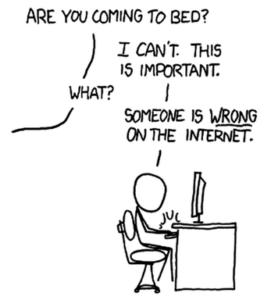
Remember the day when you were pushed into the world? The day when you were made a part of the billions of humans of the world? Well, you do not remember that particular day but having come a long way from then, you probably have interacted with a countless number of these fellow humans. You have explored many forms of life, read different kinds of books, connected with distinct types of technologies, and so much more. An underlying tendency of our species is to extract information when you interact with the stuff around you which leads to forming of beliefs about the things you come across. Over the years of growth, you probably have developed a model of all these things around you in your head.
Now, everything new that you learn with time should be following this model in your head. If it does, you feel right about it. If it does not, your brain might feel overwhelmed. It will try to defend your beliefs, even if they might be wrong. Have you ever had a classmate about whom you formed an opinion initially and did not have many facts to back your opinion? You probably had this viewpoint of yours just because of a lack of interaction with the said person. But maybe over time, that person turned out to be an exact opposite of what you initially believed. Perhaps every activity of the said person suggested otherwise as to what you thought. You started to dig up on minor things, you overlooked every fact that might contradict your belief. You did all of this only so that your opinion would not have to change about this classmate, at the same time reinforcing the beliefs you initially had.
In psychology, this is what is known as the Backfire Effect. Due to the Backfire Effect, whenever we are faced with information and facts that might contradict our belief model, instead of changing our viewpoint or forming a new opinion, your original ideas will be strengthened. Despite coming across factual proof, the mind tends to believe what was formerly fed to it. It means that showing people logical evidence which indicates that they are wrong might prove futile and end up rebounding, causing them to support their original stance with even more conviction than before. Maybe that is why your parents changed the topic of conversation when you provided a logical fact in that argument.
Some examples of the Backfire Effect-
- Birth of Jesus Christ– When do you think Jesus Christ was born? Did you say December 25 in your head? You might want to reconsider your answer. You might have read this or came across this piece of information from many sources, but the truth is that no evidence supports this.
- Voting preferences– A study that examined voting preferences showed that when people came across contradictory information about their preferred candidate, it often led to increased favour for that particular candidate, thus increased support.
- Parents’ choice to vaccinate their kids– A study showed that when parents were given information as to why they should vaccinate their kids against various diseases and that it would be the best thing to do, they became more likely not to do so and sometimes linked the vaccination with autism.
- Spreading of misinformation– Nowadays, it is effortless to spread wrong information through social media. You might have gone come across it yourselves. Or maybe your parents or grandparents have warned you about something that they have received via WhatsApp. You try to correct them but instead receive a beating for yourself. You then show them a completely valid scientific fact stating otherwise, but you are then shut down, and your parents somehow win the argument by saying that you are on your phone too much these days and should focus more on your studies. Your intent of correcting them ‘backfires’ and it leads to the forwarding of that message, thus spreading false information.
Why do people experience this effect?
As you might infer now, people undergo this effect as a result of the process that they go through when they are presented with some facts that contradict their original perceptions. When a person is presented with some information that suggests that their initial beliefs are wrong in some way, they begin to experience a mixture of invalidating emotions, causing them to feel vulnerable. This can happen when those ideas form an essential part of someone’s ideology.
The negative emotions thus generated cloud a person’s capacity to accept the corrective data that they have stumbled upon by increasing the chances of them not accurately processing the facts, and they might as well find ways to discredit this data and question its source. The Backfire Effect can be very much seen on social media. This happens when strangers get caught up on an argument online.
If you are someone who is very much active on the internet, then you might have come across two parties involved in an argument in the comments section of a thread. Or, you might have been one of the parties involved in the debate. An online discussion has never provided a clear solution to any problem. Instead, after some time, it becomes a question of having one’s ego satisfied, with both sides completely ignoring the exact details that might be useful for the debate.
Remember the last time you struck up an argument with someone online about something? Did you win it? Did you teach “cool_username_123” a lesson? You might think that you did. But the other person might also consider the same. Both of you were probably glorifying yourselves. When one of the sides starts to pull out facts and figures from deep inside the internet, it just makes the other party feel more sure of their original position. Eventually, the Backfire effect pushes both of the participants to believe their initial thoughts more and more.
How to reduce the Backfire Effect?
The Backfire Effect is a type of cognitive bias. Cognitive bias is defined as a systematic error made in judgments and decisions that someone makes.
You may think that it is rather easy to overcome this effect. You may think that you need to be more open to facts and figures that increase your knowledge. But is it that easy to tweak information that was already present in your head in a completely different manner?
One technique that would help would be critically assessing the new piece of information you have just acquired. The fundamental way can be to know the effects of the Backfire Effect and its influence and possibly train your brain in such a way that it does not throw new information straight out of the window once it does come across some of it. Maybe you could look at it with a fresh viewpoint without immediately trying to state that it is wrong. Rational thinking and processing of thoughts will go a long way in overcoming this effect. But wait, if it were that easy, why would people or the media use it to their benefit?
As already stated, the backfire effect is a type of cognitive bias, and thus there are enough proven debiasing techniques that can help one counter it. Debiasing can be defined as the reduction of bias, particularly while making any form of judgement. These techniques have a varied scope and are of different kinds. For example, one type of debiasing technique can be- visualizing situations from someone else’s perspective, someone who’s opinion we disagree with. This can help you infer a different kind of thought, in a manner you did not before. Some techniques are listed here-
- Awareness about cognitive bias- The illusion of transparency is said to be a cognitive bias where people tend to think that others know about their emotional state. People believe that the crowd that they are interacting with can tell if you are nervous or anxious. But, what if I tell you that this is rarely the case! In one experiment on this phenomena, it was seen that speakers who were informed of the illusion of transparency appeared to be more composed and confident than the ones who were not told so, having them give an even more confident speech. So, the next time you go up on that podium, remember that you are the only one who can do it without any hassle. Your audience does not have a clue about how worried you are about the speech, so why bother?
- Use more straightforward explanations rather than complex ones- When you encounter an argument, using simple and easy to decipher examples suit you more rather than digging up on complex examples. This is generally favoured in overkill backfire effect (a cognitive bias wherein people reject a complicated explanation in favour of a more comfortable alternative, which consequently reinforces their belief in the simpler alternative).
- Use nudges- Nudges are simple altercations made into an environment that can predictably modify someone’s behaviour, but not to a significant scale. The example of a nudge can be the spread of false/harmful information about a candidate. People tend to support their preferred leader even more when they come across negative information about him.
Remember the last time people praised you for doing your job in the best possible way. But did someone pass a comment that you did not complete it satisfyingly? What do you remember more? The praises that you received or that one bit of criticism? A lot of lovely comments probably slipped by neglected but that one, “you are not good enough” stayed in your head for quite a while. One theory as to why this and consequently the backfire effect happens is that one spends much more time considering facts you disagree with than you do with information that you accept.
Now, as the field of information technology progresses, you are very much likely to meet many people who exhibit different forms of behavioral patterns. Most of them probably governed by along the lines of different beliefs and ideologies. In this world, which is prospering with varying kinds of discoveries and explorations with each passing day, you are the one who still picks and chooses what to keep and what to disregard, even if it came out a lab with millions spent to research about it.
So next time you get the urge to teach “cool_username_123” a lesson, know that he might not learn the lesson you might want to teach him, but it might backfire.
~Written by Shreyes Srivastava for MTTN
~Graphics by Ashitha Melissa for MTTN
~ Edited by Tejas Mishra
Images from Google.



Leave a Reply
You must be logged in to post a comment.